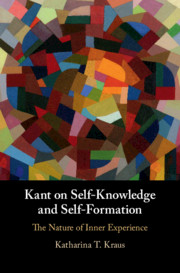Book contents
- Kant on Self-Knowledge and Self-Formation
- Kant on Self-Knowledge and Self-Formation
- Copyright page
- Dedication
- Epigraph
- Contents
- Figures
- Table
- Preface
- Introduction From Inner Experience to the Self-Formation of Psychological Persons
- Part I The Appearing Self
- Part II Self-Consciousness and the “I” of the Understanding
- Part III The Human Person and the Demands of Reason
- 5 The Guiding Thread of Inner Experience
- 6 The Demands of Theoretical Reason and Self-Knowledge
- 7 The Demands of Practical Reason and Self-Formation
- Epilogue Individuality and Wholeness
- Bibliography
- Index
6 - The Demands of Theoretical Reason and Self-Knowledge
from Part III - The Human Person and the Demands of Reason
Published online by Cambridge University Press: 01 December 2020
- Kant on Self-Knowledge and Self-Formation
- Kant on Self-Knowledge and Self-Formation
- Copyright page
- Dedication
- Epigraph
- Contents
- Figures
- Table
- Preface
- Introduction From Inner Experience to the Self-Formation of Psychological Persons
- Part I The Appearing Self
- Part II Self-Consciousness and the “I” of the Understanding
- Part III The Human Person and the Demands of Reason
- 5 The Guiding Thread of Inner Experience
- 6 The Demands of Theoretical Reason and Self-Knowledge
- 7 The Demands of Practical Reason and Self-Formation
- Epilogue Individuality and Wholeness
- Bibliography
- Index
Summary
Chapter 6, “The Demands of Theoretical Reason and Self-Knowledge”, completes Kant’s account of empirical self-knowledge – the theoretical knowledge I have of myself as a psychological person. Following Kant’s general theory of knowledge, I argue that self-knowledge requires – in addition to a cognition of myself – an attitude of assent towards this cognition and an epistemic ground for holding this cognition to be true. By laying out different types of epistemic grounds, I distinguish corresponding levels of self-knowledge. The highest level is a complete comprehension of myself based on an a priori idea of myself as a whole. While this highest level can never be attained, it sets the normative standard for all lower levels of self-knowledge. Hence, we are bound to conceptualize all psychological phenomena in accordance with a system of psychological predicates, and to approximate a complete individual self-concept, which, if available, would completely a+H9nd fully adequately describe an individual person. Finally, I outline possibilities of error, such as self-blindness and self-deceit, and revaluate the doctrine of transparency that is often ascribed to Kant.
Keywords
Information
- Type
- Chapter
- Information
- Kant on Self-Knowledge and Self-FormationThe Nature of Inner Experience, pp. 217 - 250Publisher: Cambridge University PressPrint publication year: 2020
